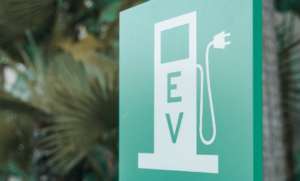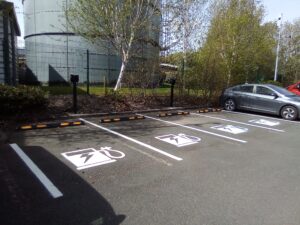Call us: 0330 002 1154
- Home
- Public
Public
- Commercial
Commercial- About
Guide to EV Charging for Universities
Discover our comprehensive resource to help universities understand the process of implementing electric vehicle (EV) charging infrastructure on their campuses.
What’s in the Guide?
- Introduction to EV charging at universities
- Planning for EV charging
- Site selection & preparation
- Choosing the right charging equipment
- Installation & maintenance
- Billing and payment solutions
- Promoting EV charging on campus
- Sustainability & environmental considerations
- Regulatory compliance
- EV charging statistics
- Next steps
As electric vehicles become increasingly popular, universities play a vital role in supporting sustainability and providing essential charging services for their students, staff, and visitors.
Introduction to EV Charging at Universities
The Importance of EV Charging
EV charging infrastructure at universities is crucial for promoting sustainable transportation options. It reduces carbon emissions and supports the UK’s commitment to environmental sustainability. Moreover, the presence of charging stations can influence prospective students and staff, enhancing the university’s reputation as an eco-conscious institution.
Benefits for Universities
Beyond environmental benefits, universities that embrace EV charging can expect cost savings, as electric vehicles are generally cheaper to operate than traditional gasoline vehicles. Additionally, EV charging stations can provide a new revenue stream for universities through user fees and booking systems. Further benefits include:
Attracting & Retaining Students
Offering EV charging facilities can make universities more attractive to environmentally conscious students and contribute to increased enrollment.
Supporting Staff & Faculty
Providing charging options benefits staff and faculty, making commuting more convenient and affordable.
Green Credentials
EV charging infrastructure aligns with the university’s sustainability goals and demonstrates a commitment to reducing the campus’s carbon footprint.

Planning for EV Charging
Identifying Stakeholders
Engage various stakeholders and involve them in the planning process, including university administration, facilities management, and sustainability departments. Collaboration between these parties can help ensure that the project aligns with the diverse needs of the university community.
Setting Objectives
Establish clear objectives for your EV charging project, aligning them with the university’s sustainability and transportation goals. These might include setting specific targets for the number of charging stations, energy efficiency, and user satisfaction.
Budgeting & Funding
In addition to university budgets, explore funding options such as government grants, private sector partnerships, and user fees. Diversifying funding sources can make the project financially feasible.
Site Selection & Preparation
Site Assessment
An effective site assessment should address the specific needs of your university. Evaluate potential charging locations based on accessibility, visibility, and demand, ensuring they meet accessibility and environmental standards. Consider factors like traffic flow, proximity to academic buildings, and student housing.
Infrastructure Requirements
To ensure EV charging stations function optimally, assess your university’s electrical infrastructure. This evaluation will help determine if upgrades or modifications are necessary to support charging stations.
Permitting & Regulations
Understanding UK regulations, including the Building Regulations, the Electric Chargepoint Grant and the Workplace Charging Scheme (WCS), is crucial. Universities must obtain the necessary permits and adhere to all legal requirements, including accessibility standards like the Equality Act.

Choosing the Right Charging Equipment
Types of Charging Stations
Select the appropriate charging station types (e.g., Level 2, DC fast chargers) based on your campus’s specific needs. You can even consider the mix of charge points to address individual needs. For example, Level 2 chargers are suitable for overnight charging, while DC fast chargers offer rapid charging for those with less time to spare.
Charging Speed & Compatibility
Determine the charging speed and compatibility requirements for your charging stations to meet the demands of your EV users, whether it be fleet vehicles or individual drivers, including being compatible with the most popular EV models to ensure your charging stations meet user demand.
Smart Charging Features
Explore smart charging options and features that enhance the user experience and help optimise energy usage. Smart features like remote monitoring, energy management, and user notifications can enhance the user experience and help the university optimise energy usage and costs.
Installation & Maintenance
Installation Process
The installation should follow industry best practices and comply with local regulations. Certified electricians and a professional installation provider should carry out the installation to ensure safety and quality.
Ongoing Maintenance
Establish a maintenance schedule to ensure charging stations remain in optimal condition, ensuring they remain reliable and safe for users. This includes routine inspections, repairs, and software updates to address any issues promptly.
At eFaraday, our inCharge Service provides 24/7 maintenance for all EV charge points.

Billing & Payment Solutions
Billing Models
Choose billing models that suit your university’s objectives. Some popular billing models include:
Free Charging
Provide free charging to users as part of the university’s services or sustainability initiatives.
Pay-per-Use
Charge users based on the amount of electricity consumed during the charging session. Some organisations even put in place fees for using the charge points.
Subscription-Based
Offer monthly or yearly subscriptions to encourage regular users and provide a predictable revenue stream.
Payment Methods
Implement a range of payment options to cater to user preferences, such as credit card payments, mobile apps, contactless payments, and integration with university ID cards for seamless transactions.
User Management
Set up user account systems to track usage, manage billing, and provide support to EV charging users. This system should also allow users to track their charging history and set up alerts for maintenance or pricing changes.
Promoting EV Charging on Campus
Marketing & Awareness
Develop a marketing strategy to promote EV charging services on campus and encourage adoption among students, staff, and visitors. Use university websites, social media, and email campaigns to reach the campus community.
Educational Initiatives
Organise educational programs and awareness campaigns to inform the campus community about the benefits of EVs and the charging process. Workshops, seminars and informal sessions can all educate users about the benefits of electric vehicles and how to effectively use the charging infrastructure. You can also collaborate with academic departments to integrate sustainability and EV topics into the curriculum.
Sustainability & Environmental Considerations
Renewable Energy Integration
Explore options for integrating renewable energy sources into your EV charging infrastructure to reduce carbon emissions. For example, solar power or wind can help reduce carbon emissions and align with a university’s sustainability goals.
Carbon Footprint Reduction
Regularly measure the carbon footprint of the EV charging infrastructure and explore ways to reduce it. This could be by involving energy-efficient equipment, smart charging algorithms and renewable energy adoption.
Regulatory Compliance
Legal Requirements
Stay informed about legal requirements and regulations related to EV charging installations, including accessibility standards. For example, the Building Regulations and the Equality Act. Compliance with these regulations ensures the charging infrastructure is accessible, safe, and follows all relevant guidelines.
Accessibility Standards
Ensure that your charging stations are accessible to all users, including those with disabilities, and can easily access and utilise the infrastructure.

EV Charging Statistics
- 20% of UK universities still don’t provide EV charging facilities.
- Out of approximately 150,000 parking spaces across UK universities, just over 1,000 of them have EV charging stations.
Next Steps
By installing adequate EV charging infrastructure, universities in the UK can contribute to a more sustainable future and provide an essential service that supports the growing adoption of electric vehicles.
Whether you are a university administrator, facilities manager, or sustainability officer, at eFaraday we can help you navigate the process of implementing EV charging infrastructure on your campus. Check out our installations within the educational sector.
Get in touch with the team to discuss more and get a free quote. Call us on 0330 002 1154 or click here.

The smart EV charge point company
enquiries@efaraday.co.uk
0330 002 1154Aviation House, Swordfish Way,
Sherburn in Elmet, Leeds, LS25 6NG. UK
Company registration number 12983787
Registered office is Camburgh House, 27 New Dover Road, Canterbury, Kent, United Kingdom, CT1 3DN
©2024 eFaraday. All rights reserved. Privacy Terms & ConditionsThe smart EV charge point company
enquiries@efaraday.co.uk
0330 002 1154Aviation House, Swordfish Way,
Sherburn in Elmet, Leeds, LS25 6NG. UK
Registered office is Camburgh House, 27 New Dover Road, Canterbury, Kent, United Kingdom, CT1 3DN
Company registration number 12983787
©2024 eFaraday. All rights reserved.
- Commercial
eFaraday is no longer trading and has gone into administration. For further details, please contact the administrators at http://www.krestonreeves.com



